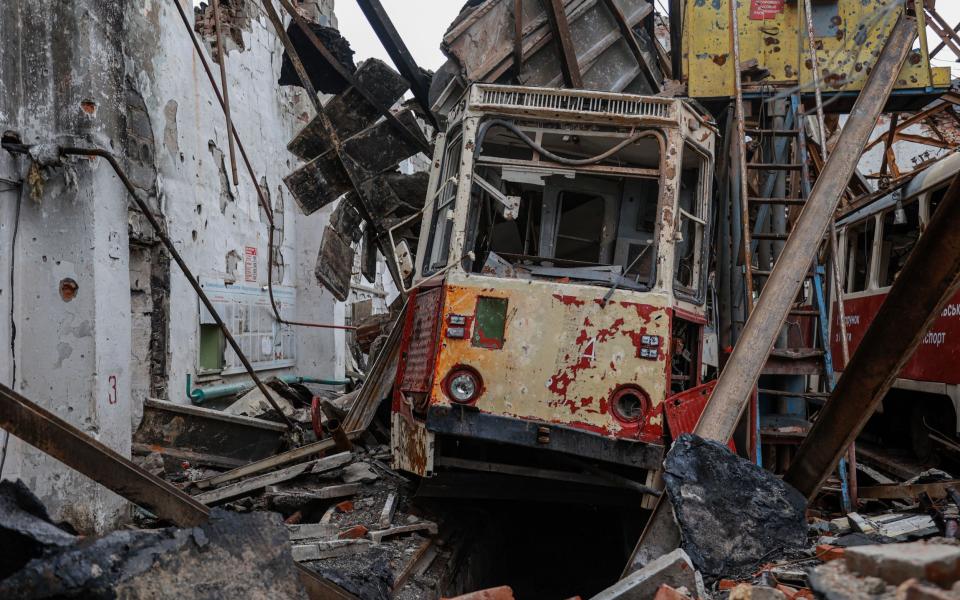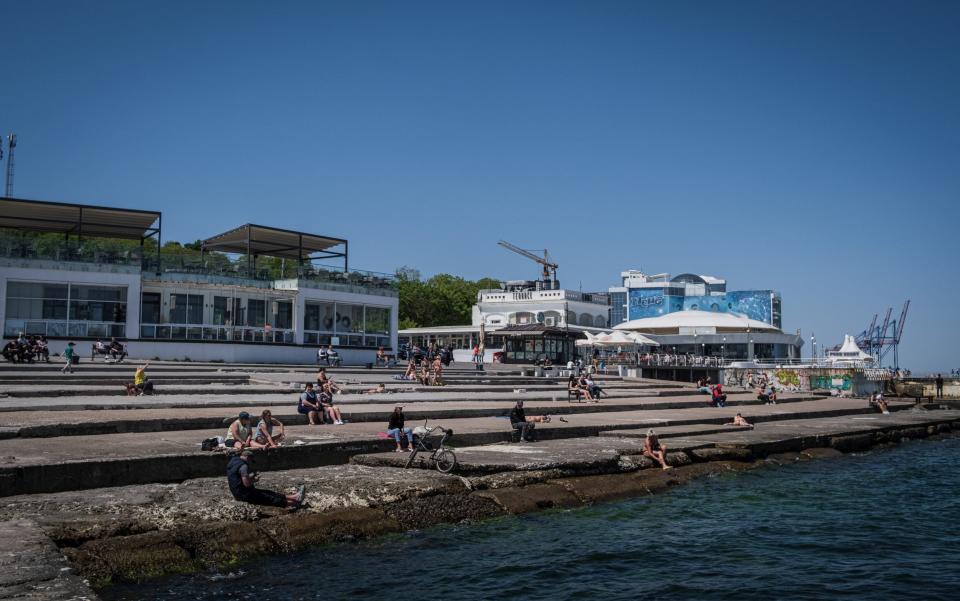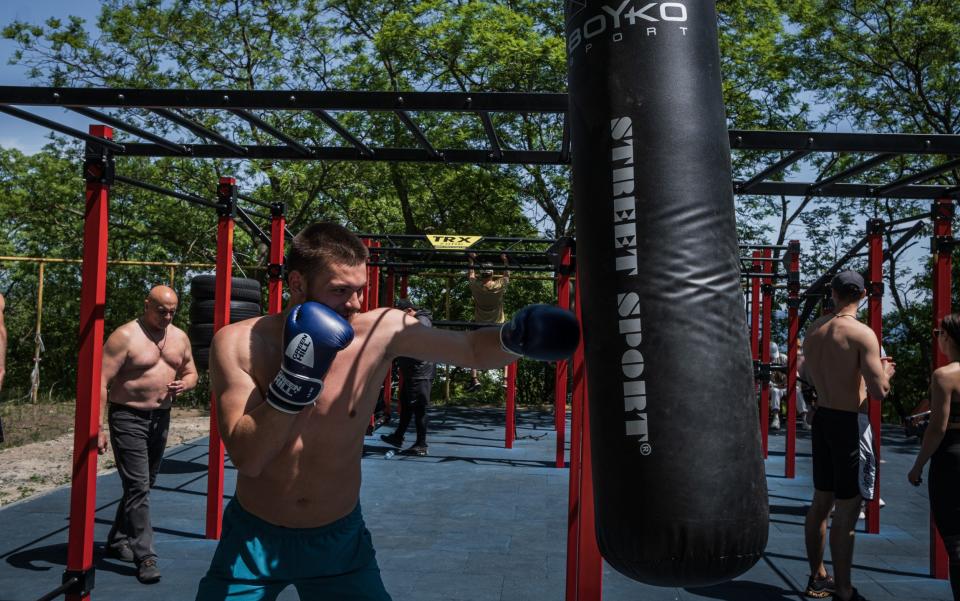Odesa or the French Riviera? War doesn't stand in the way of Ukraine's beachgoers

When President Volodymyr Zelensky addressed Britain’s Parliament in March, he evoked the spirit of Churchill by vowing to fight on the beaches.
Two months on, the coast round the Black Sea city of Odesa remains braced for invasion, with air raid sirens and missile attacks.
On the beaches themselves, though, the main risk of battle looks likely to be rows over sunloungers. Despite the odd thump of naval exchanges out at sea, the city’s seaside strip was full of sunbathers this weekend, as a May heatwave brought temperatures of 25C.
A few hundred miles further east, the port of Mariupol lies in ruins, while tank battles rage in Donbas. Odesa, though, could be the French Riviera, with beachside bars open, and well-honed beach bodies topping up their tans. Wish you were here?

Many of Odesa's beaches are still landmined, admittedly, while an 8pm curfew limits the chance for sundowners. And with much of the country still at war, some might wonder if anyone should be beachbumming at all.
But after two years of Covid and three months of conflict, Odesa's tourist industry needs business to survive. And for those hitting the beach, a dose of early summer sun feels just right after a winter of war.
"Sometimes you just want to lead a normal life, otherwise you start to go mad under permanent stress," said Vadim Holubenko, who was at the beach on Friday.
A shipping agent by trade, he has been unable to work since February because of Russia's naval blockade of Odesa's container port. "I just come to sit here and get sunburned for a while - there's not much else to do in my line of work anyway," he said.
Home to a million people, Odesa has long been a tourist draw for Ukrainians, for whom it was also a cultural capital prior to the Soviet-era.

As well as sandy beaches, its attractions include the 19th century Potemkin Stairs, a grand staircase of 192 steps leading up from the harbour.
The city's Art Nouveau architecture feels more European than Russian - and just like Cannes, there's a film festival every year.
The past month has seen Odesa suffer renewed bombardments from Russian forces, who still intend to push west to capture it. A fortnight ago, it was struck by seven missiles, one demolishing an entire shopping centre.
However, with Russian ground forces still bogged down outside Mykolaiv - 100 miles east - and making little real progress, Odesa's tourism chiefs are rolling out the welcome mat as usual.
"It's nice to see you here," says Alexander Sheka, the city's deputy director of tourism, who breezily describes the missiles as "hellos from our neighbours".
"Of course the tourism season has suffered here already this year," he adds. "But the president's office is saying it's better to be at work helping the economy if we can."
This year, visitors will have to watch out for more than just jellyfish or riptides. Many beaches have been landmined to prevent an amphibious assault, while Russian warships have left hundreds of mines in the sea.
Photography is banned along large parts of the seafront, including the Potemkin Steps, limiting the chance for holiday selfies.

Like tourism bosses in the movie Jaws, Mr Sheka is torn between encouraging tourists to visit, and warning them of potential dangers. For example, he is currently finessing new air-raid evacuation procedures for museums, as well as for people wearing just bikinis and swimming trunks.
"We have to work out what to do if there are people out swimming when something happens," he said.
On the main seafront strip, where there are nightclubs, parks and amusement arcades, the only sounds of gunfire right now come from the model AK-47s at the shooting gallery.
On a road nicknamed Fitness Boulevard, joggers and cyclists stream by. For many, it is such normal activities themselves that now feel strange.
Tetiana Slavova, 30, who had just finished an exercise class, was reminded of the film The Matrix, where characters slip from one reality to the next.
"The war has taught people to enjoy what good moments they can, even if it's just having a cup of good coffee here on the beach," she said.
"My fitness coach had some people commenting to him online, asking why is he running fitness classes when people are dying," she said. "But he's not a soldier - he's just doing what he knows best, and he made 30 people in my class happy today."

Ms Slavova was sat at the Santorini, a popular beachside restaurant and cafe, where manager Natalia Polonska, 36, is now doing a busy weekend trade.
"We have to stop serving alcohol at 6pm but people just buy extra drinks so they can stay a bit longer," she said. "I'm not optimistic about business this summer, but we survived Covid, so we'll cope."
Would she serve a Russian tourist if they came? "Hmm. Everybody is entitled to a holiday, but I don't we probably would right now."
That prospect is unlikely anyway. Russian visitors largely stopped coming here after the Kremlin's 2014 annexation of Crimea. But the loss of Russians was offset by gains from patriotic Ukrainians who used to go to Crimea.
And even if this year's summer season proves lousy, Mr Sheka, the tourism boss, has a weapon up his sleeve for next year: Ukraine's recent Eurovision Song Contest triumph, which entitles the winning nation to host the event.
"We’re hoping it's going to be here in Odesa," he said.

